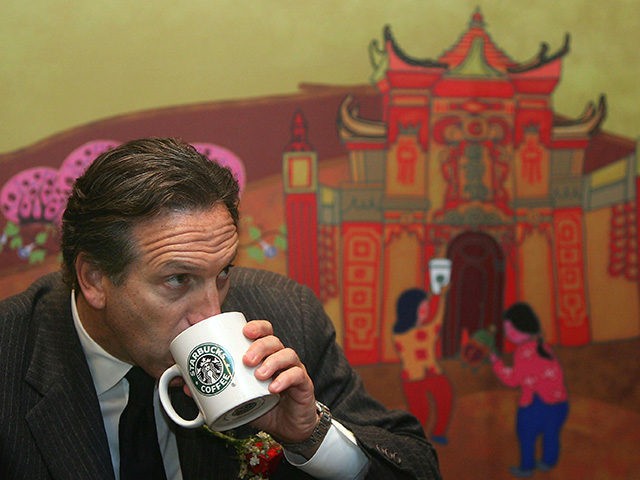Starbucks investor Howard Schultz wants to get elected president and to amnesty at least 11 million illegal migrants in the United States.
But his justification for the amnesty includes no rules or principles that would prevent his huge amnesty from expanding into an open-borders policy which would benefit investors at the expense of white-collar and blue-collar Americans, said Jessica Vaughan, policy director at the Center for Immigraiton Studies.
Schultz told 60 Minutes:
The country, first and foremost, is based on humanity, fairness, goodness. We have been for 200 plus years a country of immigrants, and for the 11 million people here, unauthorized, there should be a fair and equitable way for them to get in line, pay the taxes, pay a fee and become citizens of the United States.
“What I hear is not only platitudes about immigration and cliches about an amnesty being earned … but a complete ignorance and disregard for the effects on Americans of unlimited immigration,” said Vaughan.
Shultz’s statement suggests that “there is no such thing as an American, and that America is just a collection of anyone who wants to come, rather than a nation with laws and unique culture … He is speaking as if the concept of an American nation is obsolete or never was there to begin with.”
Shultz also seems to think that Americans have nothing to say about immigration, she said. His statement “is all about the immigrants, and not about what is the best policy for our country.” For Schultz, “there is just no downside to unlimited immigration.”
The perspective is common among bankers and investors, such as Schultz, because they gain economically when the federal government imports welfare-aided consumers and cheap workers. Overall, investors tend to prioritize economic growth above Americans’ concerns about wages and salaries, crime and real estate costs, civic harmony, and government priorities.
For example, Politico posted a January 28 article about the political priorities of the nation’s leading bankers who describe themselves as “centrists” even as they push for more cheap labor migration:
“I’m a socially liberal, fiscally conservative centrist who would love to vote for a rational Democrat and get Trump out of the White House,” said the CEO of one of the nation’s largest banks, who, like a dozen other executives interviewed for this story, declined to be identified by name for fear of angering a volatile president. “Personally, I’d love to see [billionaire investor Mike] Bloomberg run and get the nomination. I’ve just never thought he could get the nomination the way the primary process works.”
Across Wall Street and more in executive suites across the nation, corporate titans are trying to figure out how to navigate the 2020 presidential election. While some executives remain supportive of Trump — especially in industries like energy given the president’s approach to climate change — many recoil at his chaotic approach to governance and harsh approach to trade and immigration …
…
After mentioning Bloomberg, Wall Street executives who want Trump out list a consistent roster of appealing nominees that includes former Vice President Joe Biden and Sens. Cory Booker of New Jersey, Kirsten Gillibrand of New York and Kamala Harris of California. Others meriting mention: former Virginia Gov. Terry McAuliffe, former Colorado Gov. John Hickenlooper, former Maryland Rep. John Delaney and former Texas Rep. Beto O’Rourke, though fewally know his positions.
Schult also co-founded a San Francisco investment fund called Maveron which specializes in consumer-related companies:
Our companies marry disruptive tech with soulful, beloved brands into an unstoppable and unforgettable consumer experience. Because middlemen are so 20th century.
Schultz’s investments would gain if the government amnesties illegals and imports additional consumers and workers.
But the nation needs to reduce the current level of immigration so that Americans can rebuild their shared culture, said Vaughan. The current demographic situation is “unprecedented.”
“We’ve had so many years and decades of constantly increasing immigration without a period of low immigration that enables the country to absorb immigrants and have them become Americans,” she added.
The establishment’s economic policy of using legal and illegal migration to boost economic growth shifts enormous wealth from young people towards older people by flooding the market with cheap white-collar and blue-collar foreign labor.
That annual flood of roughly one million legal immigrants — as well as visa workers and illegal immigrants — spikes profits and Wall Street values by shrinking salaries for 150 million blue-collar and white-collar employees and especially wages for the four million young Americans who join the labor force each year.
The cheap labor policy widens wealth gaps, reduces high tech investment, increases state and local tax burdens, hurts kids’ schools and college education, pushes Americans away from high tech careers, and sidelines millions of marginalized Americans, including many who are now struggling with fentanyl addictions.
Immigration also steers investment and wealth away from towns in Heartland states because coastal investors can more easily hire and supervise the large immigrant populations who prefer to live in coastal cities. In turn, that coastal investment flow drives up coastal real estate prices and pushes poor U.S. Americans, including Latinos and blacks, out of prosperous cities such as Berkeley and Oakland.

COMMENTS
Please let us know if you're having issues with commenting.